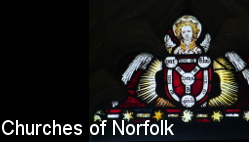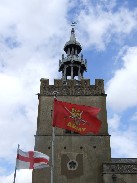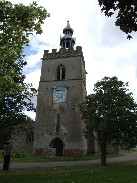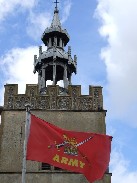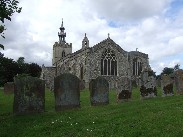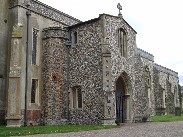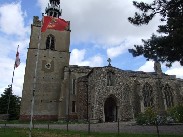| |
|
All
Saints, Shipdham
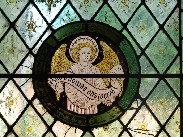 |
|
Shipdham
is a fairly large, pleasant village on the road
between Dereham and Watton, almost exactly in the
middle of Norfolk. The road cuts down around the
graveyard, which is cordoned by a high wall, but
peering high above all is one of the most
singular church crownings in Norfolk. The late
medieval tower is surmounted by a great wood and
lead fleche, pointing to heaven. It is almost
eastern in character, as if borrowed from a
Russian orthodox church. I've read various
conflicting dates for it, but I wondered if it
might be a confection from the early 17th
century, possibly to replace a spire that had
fallen. This is not a huge church, but it is
certainly an imposing one, with a great presence.
The massive south porch reaches to the roof of
the aisle, and as there is no clerestory on this
side it seems even larger.
|
As
Mortlock pointed out, such a handsome church would not
look out of place in a prosperous market town, and I am
afraid that the flipside of this is that the interior is
also urbanised and rather anonymous. It is essentially a
19th century church within the shell of a medieval one,
but it is not without its interesting early survivals.
The most
unusual feature here is now mounted on the west wall of
the nave, above the organ. This is the great tympanum
painted with the royal arms of Charles I. They have been
updated to the other side of the Commonwealth for Charles
II. Until the 19th century restoration, it fitted neatly
into the top of the chancel arch, and the panelling may
be older, possibly originally painted with the arms of
Elizabeth I, or even from the pre-Reformation rood. The
arms are interesting rather than beautiful, but both
those adjectives can easily be applied to the decalogue
boards which once fitted beneath it. These are now
mounted on the wall of the north aisle, and can be
examined at close quarters. The date, 1630, reveals the
original date of the arms. The corbel heads which support
the boards are older, but they are also not in situ.
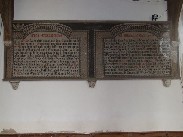 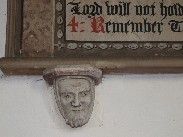 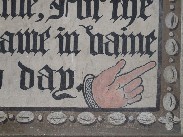 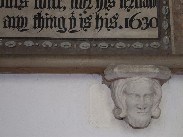
East
Anglia has more than its fair share of late medieval
latten lecterns, but Shipdham has something a little more
unusual. Although it is very similar in appearance, the
lectern here is made of wood, with exquisite little lions
in the familar style at its feet. It has done
tremendously well to survive the wear and tear of half a
millennium. It was probably built during the same decade
that the font in the north aisle was being carved. This
appears to be the font that was in use here for
centuries, but Shipdham has a second font, much older,
dating from the Norman period. It was supposedly found in
a garden in the village, and has now been returned to its
proper place at the west end of the church.
| There
is some decent 19th century glass, including a
tender Nativity scene, with the wise men adoring
and offering their gifts, while a little page boy
looks on in wonder. Otherwise, as I said, I fear
that the interior feels a touch anonymous, as if
we might be in a town church, but it is very well
cared for, and pleasant to wander in. Like many
large village churches in Norfolk, it feels a
busy place, with lots of local involvement, and
it is open every day, so you can't really ask
more than that. Finally, no one could come
to this church without noting the military
presence. Big flags fly above the war memorial
garden outside, and the north chancel chapel is a
positive shrine of flags. It is likely that they
would be the main impression of All Saints that a
casual visitor would take away, which is perhaps
a pity.
|
|
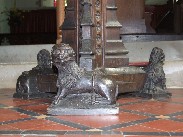 |
|
|
|
